Chinese state media, content farms spread anti-UK narratives to halt Hong Kong emigration
Narratives amplified UK’s COVID challenges and presented its Hong Kong visa program as a scam.
Chinese state media, content farms spread anti-UK narratives to halt Hong Kong emigration
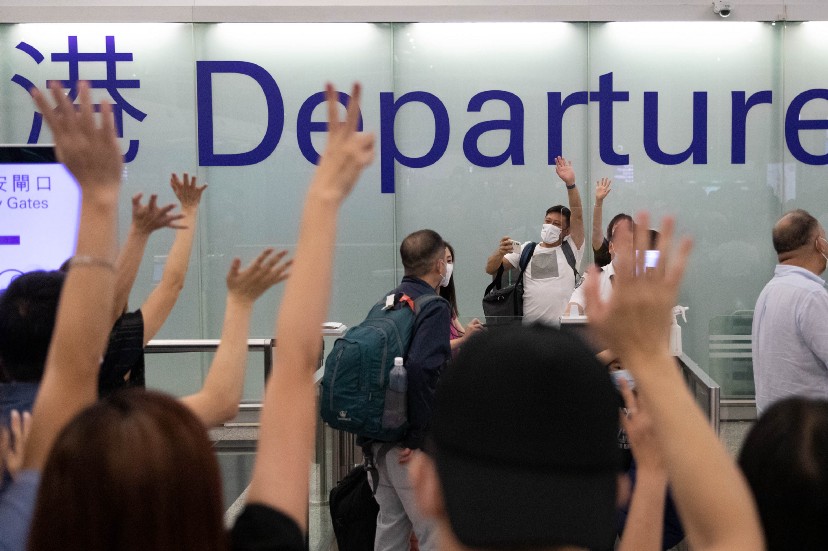
BANNER: Narratives amplified UK’s COVID challenges and presented its Hong Kong visa program as a scam
As hundreds of thousands of Hong Kong residents immigrate to the United Kingdom, Chinese state media and Facebook accounts linked to a Malaysian content farm are spreading narratives that denigrate the UK. The dominant narratives spread by state media purport that the UK has been decimated by COVID-19 and that the visa option offered to Hong Kongers is a scam. In addition, a Facebook network with links to a Malaysian content farm is also spreading anti-UK narratives. The pro-China, anti-UK narratives are an attempt to influence Hong Kongers seeking refuge from the increasingly draconian measures taken by China to assert dominance over Hong Kong.
In response to widespread protests in 2019, Hong Kong ratified a National Security Law (NSL) on June 30, 2020, which eroded democracy and the rule of law, prompting a mass exodus of residents from the territory. The NSL has effectively criminalized dissent, resulting in the arrest of democratic politicians, journalists, and even religious leaders. The UK, which colonized and controlled Hong Kong until 1997, introduced a British Nationals Overseas (BNO) visa immigration program on January 31, 2021, to resettle existing BNO status holders who registered as BNOs before the UK handed Hong Kong over to China in 1997, along with their families. The UK Home Office calculated that the net economy benefit of BNO migrants will be between £2.4 and £2.9 billion over five years. As of June 2022, there have been 140,500 applications for the BNO program. This massive outflow of residents has worried Beijing, a sentiment that is reflected in state media reporting.
Chinese officials and state media have expressed strong opposition to the UK’s involvement in Hong Kong affairs. In July 2019, Liu Xiaoming, then China’s ambassador to the UK, sparked a diplomatic row after he accused the UK government of “gross interference” for its support of Hong Kong protesters. As a result, Chinese state media narratives related to Hong Kong generally focus on discouraging emigration and undermining the legitimacy of the UK’s involvement in any aspect of Hong Kong’s political or legal affairs.
In addition, the DFRLab found that a large proportion of anti-UK content targeting Hong Kongers on Facebook was spread by pages linked to a Malaysia-based content farm previously connected to disinformation campaigns that attempted to influence Taiwan’s presidential election. Facebook is not censored in Hong Kong or Taiwan as it is in China, and the platform is popular among Taiwanese and Hong Kong audiences, making it an attractive target for pro-China information operations. The narratives pushed by these Facebook accounts appear to be aimed at discouraging emigration. For example, the hashtag #二等公民 (“second class citizen”) appeared across many posts describing the life of a Hong Kong immigrant in the UK.
Chinese state media spreads falsehoods to discourage Hong Kong emigration
China views Hong Kong as an internal matter and sees current UK policy toward the island as interfering in its domestic affairs. Beijing also sees potential significant downsides to Britain’s visa policies for Hong Kong migrants, especially the BNO visa, which China worries could lead to “brain drain” from the island. China views Hong Kong and its human capital as essential to maintaining and furthering its economic goals.
The DFRLab’s survey of Chinese state media narratives revealed two key tactics for discouraging emigration, and even travel, to the UK. The first narrative emphasizes that COVID has reduced the quality of life in the country, while the second works to discredit the BNO visa program.
A translated BBC article that was reposted numerous times by Chinese state media outlets illustrates China’s core messaging in the headline, “Man shouts in regret after returning to the UK: I shouldn’t have left China at all.” The original BBC article, which appears as a screenshot in the Chinese version, included the English-language headline, “Coronavirus: Wuhan evacuee ‘should never have left China’.” Besides exaggerating the original title, the translated article conveyed the original BBC article rather accurately. Chinese state media does not shy away from citing Western news media — including organizations it criticizes for spreading “fake news” — when the article supports China’s agenda.
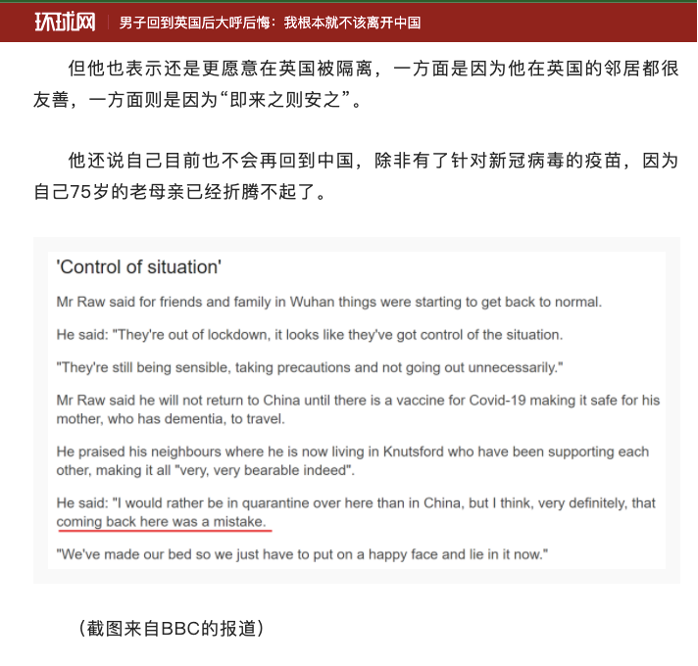
Another narrative spread in People’s Daily, Global Times, and Guancha alleged that BNO visas were an attempt by the UK government to defraud Hong Kong residents into boosting the UK’s lackluster economy in the wake of the pandemic and Brexit. Additionally, these outlets argued that Hong Kongers would be under-employed in the UK due to the poor job market and language barriers, claiming immigrants would not be able to find employment that matched their skillset and education. Anti-Asian racism, ongoing commodity shortages, and high living costs were also covered in Chinese state media as reasons why Hong Kong residents should not emigrate to the UK.
The anti-UK articles were published at crucial political moments that involved Hong Kong. State messaging primarily revolved around the Chinese Foreign Ministry denouncing “foreign interference” in “domestic affairs” before the visa offer. The articles evolved as the immigration policy was being implemented. For example, China Daily highlighted a comment made by a former Hong Kong chief executive calling the visa offer “cheap,” a day after then-Prime Minister Boris Johnson first introduced the reformed immigration policy. These claims also formed the foundation for the narratives amplified by the content farms.
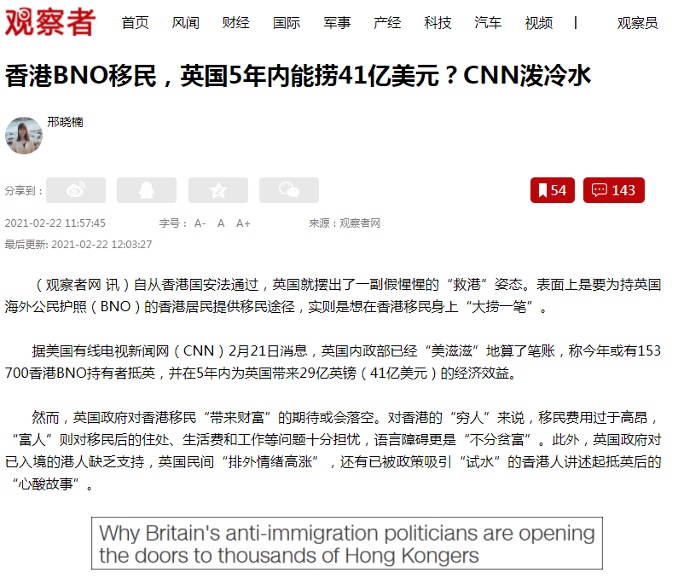
Malaysia-based content farm targets Hong Kong audiences
For this investigation, the DFRLab reviewed pro-China news outlets and social media pages to examine narratives about COVID in the UK, which was the most frequent event cited to discourage Hong Kong emigration. The analysis showed a concerted effort to spread a narrative about soaring infection rates and the UK government’s struggle to manage the pandemic. The DFRLab used this as the starting point for its analysis of Western social media platforms.
A series of queries using Meta-owned analysis tool CrowdTangle showed that between January 2020 and January 2022 there were 16,873 Chinese-language posts about COVID-19 in the UK; these posts garnered 2,928,635 interactions across public Facebook groups and pages. Analysis of the posts showed that the primary narrative focused on contrasting the UK and China’s response to COVID, attacking the former for mismanagement, while portraying the latter as a competent and benevolent force.
When filtering the results to posts from pages most relevant to Hong Kong audiences, the findings showed that Facebook pages with administrators located in Malaysia accounted for 89 percent of interactions and 69 percent of posts. Pages with administrators located in China and Hong Kong accounted for most of the remaining posts and interactions. For comparison, when filtering for content and pages most relevant to UK audiences, there are only fifteen interactions and ten posts over the two-year period, and all were from the overtly anti-China news source Epoch Times.
The posts from Malaysia predominantly featured sensationalist headlines about the UK faring poorly during COVID-19. The engagement on the posts peaked on March 23, 2021, with more than 6,000 interactions.

The DFRLab discovered that the posts and interactions coming from Malaysia were linked to the Qiqi News Network content farm based in Malaysia. Previous reports have linked the Qiqi network to disinformation campaigns that attempted to influence the 2020 presidential election in Taiwan.
The majority of the Facebook posts identified by the DFRLab featured links that redirected to the same phony news organization, Qiqi News Network. In December 2019, an investigation by the independent Taiwanese news outlet The Reporter traced Qiqi to Yee Kok Wai, a content-farm manager working for a larger operation run by Evan Lee, a Chinese national living in Malaysia. Lee’s content farm operation enables users to earn money by generating traffic through clickbait articles. Many of the domains in the operation are responsible for spreading disinformation in Taiwan through groups on the messaging platform LINE, which is popular on the island.
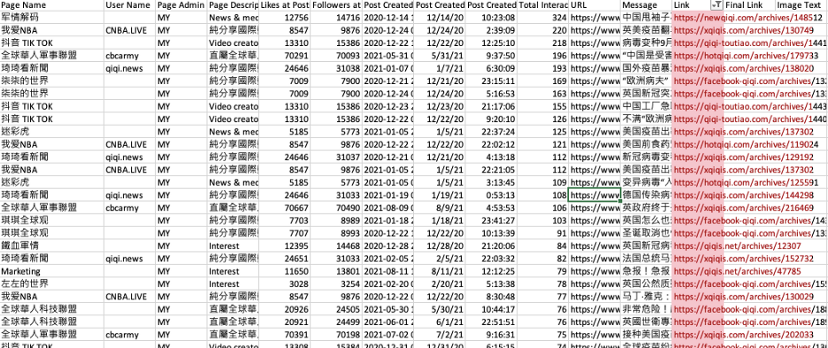
In another example, the Facebook group 全球華人軍事聯盟 (“Global Chinese Military Affairs Alliance”), which has been previously linked to Yee and the Qiqi News Network, shared dozens of anti-UK articles. The group became private in 2021, following the expose from a Taiwan-based news organized publicizing its ties to content farms. The DFRLab identified thirteen Facebook pages managed by the Global Chinese Military Affairs Alliance Facebook group that are still public. These pages often share posts linking back to the Qiqi News Network. One of the Facebook pages managed by the group, 華人新村 (“Chinese New Village”), posted on June 19, 2021 a link to a false Qiqi news article with the headline, “Third round of the [COVID-19] outbreak in Britain! AstraZeneca vaccine ineffective, may buy Sinovac vaccines from China.”

Many of the pages in this network also coordinated their posting behavior, with examples as recent as April 2022. Three of the pages managed by the Global Chinese Military Affairs Alliance Facebook group published identical posts on April 3 at 2:26am Eastern Daylight Time; they all featured the same link to a Qiqi News Network article criticizing British judges for “politicizing the Hong Kong issue” by resigning from Hong Kong’s highest court.
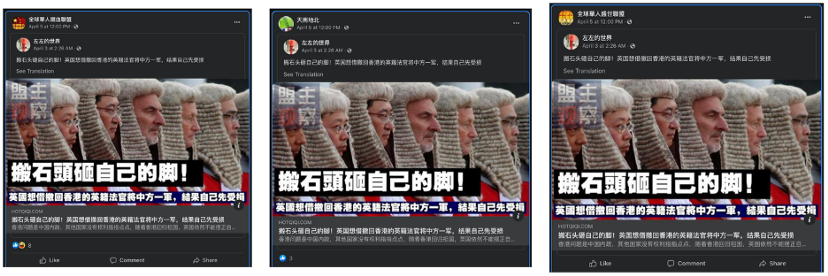
Similar patterns could be seen among Chinese-language posts about the post-Brexit UK economy, another popular anti-UK narrative. A CrowdTangle query found 474 Facebook page posts about the topic with 26,882 interactions between January 2020 and January 2022. Pages with administrators located in Malaysia accounted for 73 percent of the interactions and 42 percent of the posts. When filtering by relevance to Hong Kong audiences, Facebook pages connected to known content farms located in Malaysia again were the top posters.
Other posts shared anti-UK narratives that mirror Chinese state media claims, including Chinese criticisms that the United States influenced the UK’s decision to ban Huawei from its 5G network in July 2020. A post from the Chinese New Village page sensationalized this narrative with the headline, “Britain breaks path, acts as dog of the US, and rips out Huawei equipment; Li Ka Sheng will help.” Li is one of the region’s wealthiest businessmen and philanthropists.
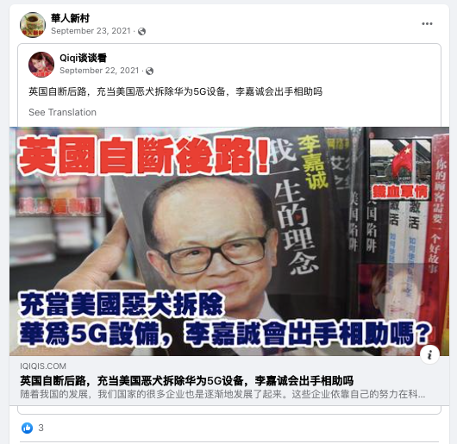
These findings demonstrate the link between narratives specifically targeting a Hong Kong audience and a content farm with a known history of spreading pro-CCP disinformation. The fact that a vast majority of the posts within this network came from content farms spreading Chinese state-approved narratives, rather than organic accounts, is evidence of a potential campaign targeting Hong Kong audiences. Working in conjunction with state media coverage, these narratives on Facebook share a common purpose: to foster pro-China sentiment and to paint an image of the United Kingdom as an unsafe and undesirable place to live.
Kenton Thibaut is Resident China Fellow at the DFRLab.
Cite this case study:
Kenton Thibaut, “Chinese state media, content farms spread anti-UK narratives to halt Hong Kong emigration,” Digital Forensic Research Lab (DFRLab), October 20, 2022, https://medium.com/dfrlab/chinese-state-media-content-farms-spread-anti-uk-narratives-to-halt-hong-kong-emigration-9a88f

